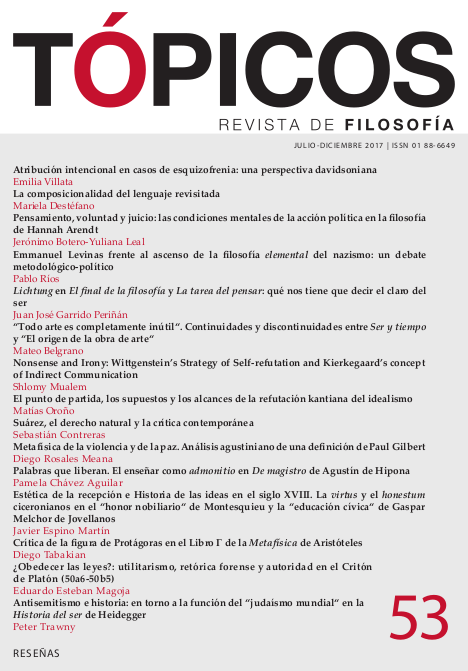Artículos
Pensamiento, voluntad y juicio: las condiciones mentales de la acción política en la filosofía de Hannah Arendt
Publicado 2017-07-01
Palabras clave
- Arendt,
- pensamiento,
- juicio,
- acción
Cómo citar
Leal, Y., & Botero, J. (2017). Pensamiento, voluntad y juicio: las condiciones mentales de la acción política en la filosofía de Hannah Arendt. Tópicos, Revista De Filosofía, 53, 85. https://doi.org/10.21555/top.v0i53.830
Resumen
En The Life of the Mind, Hannah Arendt sostiene que el pensamiento crítico activa el ejercicio del juicio reflexionante. El ejercicio del pensamiento crítico y el juicio reflexionante es fundamental para fomentar la libertad de actuar políticamente. El propósito de este artículo es defender la hipótesis de que el pensamiento crítico, la voluntad como espontaneidad y el juicio reflexionante son las condiciones mentales que hacen posible la vida política de los seres humanos desde la perspectiva de Arendt.
Referencias
- Arendt, Hannah (1999) “Comprensión y política”, en: De la historia a la acción, Barcelona: Paidós.
- Arendt, Hannah, (1958) The Human Condition, Chicago & London: University of Chicago Press.
- Arendt, Hannah, (1982) Lectures on Kant´s Political Philosophy, Chicago: University Chicago Press.
- Arendt, Hannah, (1978) The Life of Mind, New York: Harcourt Brace Jovanovic.
- Arendt, Hannah,(2007) Responsabilidad y juicio, Barcelona: Paidós.
- Beiner, Ronald, (1982) “Hannah Arendt on Judging”, en: Arendt, Hannah, Lectures on Kant´s Political Philosophy, Chicago: University of Chicago Press.
- Benhabib, Seyla, (1990) “Arendt and the Redemptive power of narrative” en: Social Research, n°1, LVII, pp. 167-196.
- Benhabib, Seyla, (2003) “The Art of Making and Subverting Distinctions: With Arendt, Contra Arendt”, en: The Reluctant Modernism of Hannah Arendt, United States of America: Rowman & Littlefield Publishers.
- Birulés, Fina, (2001) Una herencia sin testamento: Hannah Arendt, Barcelona: Herder.
- Campillo, Neus, (2013), Hannah Arendt: lo filosófico y lo político, Valencia: Publicaciones de la Universidad de Valencia, pp. 121-122.
- Canovan, Margaret (1992), Hannah Arendt: A Reinterpretation of Her Political Thought, Cambridge: Cambridge University Press
- Hilb, Claudia (1994), El resplandor de lo público. En torno a Hannah Arendt, Caracas: Nueva Sociedad.
- Honig, Bonnie, (1988) “Arendt, Identity and Difference”, en: Political Theory, Vol. 16, No. 1, pp. 77-98
- Jacobitti, Suzanne, (1988) “Hannah Arendt and the Will”, en: Political Theory vol. 16.º, Nº 1, pp. 53-76.
- Kant, Immanuel (2007), Crítica del Juicio, Madrid: Editorial Espasa Calpe.
- Kant, Immanuel, (2002) “Respuesta a la pregunta ¿Qué es la ilustración?” en: ¿Qué es la ilustración?, Madrid: Tecnos, pp. 26-27.
- Passerin d’ Entrèves, Maurizio (1994), The Political Philosophy of Hannah Arendt, London: Routledge, pp. 84-85.
- Ricoeur, Paul, (1991). “De la filosofía a lo político. Trayectoria del pensamiento de Hannah Arendt”, en: Revista Debats Nº 37, Valencia: Ediciones de la Universidad de Valencia.
- Tassin, Etienne, (2001) Hannah Arendt: L´Humaine Condition Politique, París : L´Harmattan.
- Young-Bruehl, Elizabeth, (2006) Why matters Arendt, U.S.A: Yale University Press.
- Wellmer, Albrecht, “Hannah Arendt sobre el juicio: la doctrina no escrita de la razón” en: Fina Birulés (comp.) (2000), Hannah Arendt: el orgullo de pensar, Barcelona: Gedisa.






